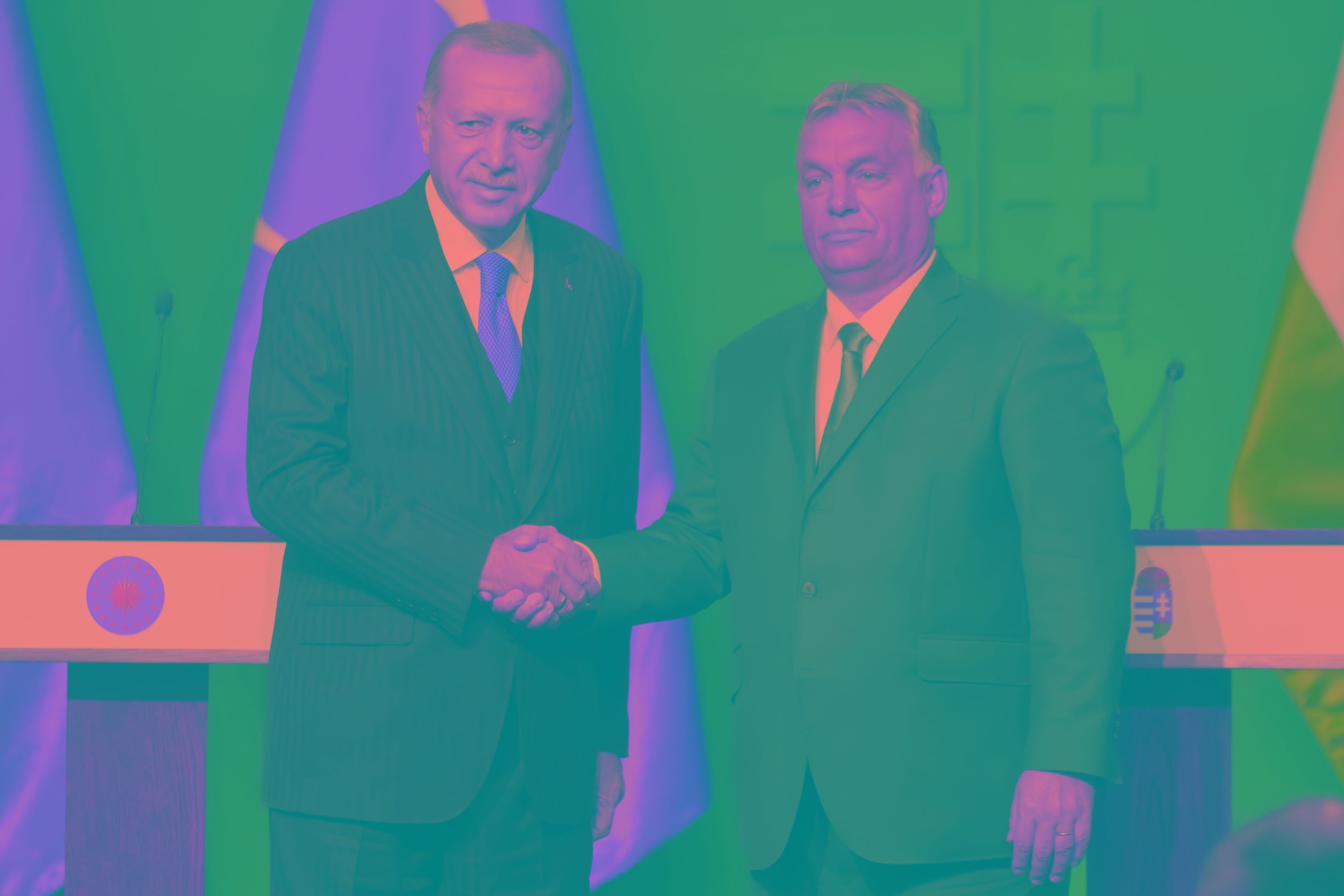Hungary’s Policy toward Turkey

The EU Context of Bilateral Relations
In recent years, Hungary has been showing political support for the Turkish authorities, most often among EU countries. Contrary to the EU position, the Hungarian authorities have supported Turkish President Recep Tayyip Erdoğan’s actions in Syria. After Turkey launched its military operation there in October, Hungary blocked the adoption of a joint statement by the Member States condemning Turkey’s intervention. The document was eventually published as a declaration by the EU High Representative for Foreign and Security Policy. However, Hungary did not oppose further EU action on this matter, including the adoption of conclusions following the European Council on 17–18 October. In them, the Council appealed to Turkey to end military operations, withdraw troops from Syria and respect international humanitarian law. Also, MEPs from the ruling Fidesz party voted for a resolution calling for sanctions against Turkey. Hungary had previously represented an isolated position in the EU towards Turkey, including in July 2016 when it recognized the failed military coup against the Turkish authorities as a terrorist attack and expressed solidarity with them. At the time, the Hungarian government opposed the EU exerting influence on Turkey’s internal affairs and it was against demanding compliance with democratic standards in seeking out coup plotters.
Hungary supports the current Turkish authorities because it is convinced that Turkey plays a key role in easing the pressure on the EU related to the migration crisis. Adopting the Turkish discourse, Hungary has recognised the creation of a “security zone” where some Syrian refugees will be sent—out of Turkey—as a necessary condition for preventing another migration crisis in the EU. At the same time, confrontation has been part of the Hungarian government’s European policy for some time. Since 2010, these “conflicts with Brussels” have been used, on the one hand, in domestic politics as a rhetorical device to create the image of an enemy and a sense of external threat, as well as to emphasize the authorities’ independence in decision-making. On the other hand, these conflicts translate into actual legal and diplomatic disputes, weakening EU cohesion.
Political Relations
The intensification of Hungary’s bilateral relations with Turkey at the highest level started after the Hungarian government announced its “Eastern Opening” policy in 2011. It is based on prioritising trade in foreign policy and boosting economic relations with non-EU countries. Since 2013, Erdoğan and Hungarian Prime Minister Viktor Orbán have met every year, most recently on 7 November in Budapest. Talks on Hungary’s possible participation in reconstruction programmes in the “security zone” in Syria, armaments cooperation, trade, or energy indicate that both sides treat bilateral relations comprehensively and see great potential in joint actions.
The relations have an ideological foundation in Hungary. Orbán defines good relations with Turkey, as well as with Germany and Russia, as the basis for conducting effective foreign policy. According to this assumption, these countries’ positive interest in Hungary ensures its security. Orbán specifies the political systems of Turkey, Russia, and China as prospective state models. He often links this thought with antiestablishment criticism of liberal democracy, setting in opposition what he describes as an inefficient West and these three states, which, he claims, function more effectively.
To further justify the close relations, the Hungarian government cites the supposed common origin of the Hungarian and Turkish peoples. It is an attempt to build a false identity that is not based on scientific evidence. The public institution Magyarságkutató Intézet (Institute of Research on Hungarians) was established in 2019 to try to prove this alternate theory of the roots of Hungarians and the Hungarian language. The assumption has been pronounced by Orbán during meetings of the Cooperation Council of Turkic-Speaking States, consisting of Kazakhstan, Kyrgyzstan, Uzbekistan, Turkey, and Azerbaijan, in which Hungary has been an observer since 2018, sharing this status with Turkmenistan.
From Turkey’s point of view, other elements of Hungarian memory policy may also favour bilateral relations. The period of Ottoman rule in Hungary (1541–1686) has been reinterpreted. An example of this is an exhibition opened by Erdoğan in 2018 in the renovated 16th-century tomb of the Turkish dervish Gül Baba in Budapest, which presents this period as a time of peaceful coexistence, instead of one of rule by a foreign empire. Hungary also belongs to the minority of EU countries that do not recognize the mass killings of Armenians by the Ottoman Empire during the First World War as genocide.
Economic Interests
Hungary has high hopes for developing economic relations with Turkey and Turkic countries, although the total value of trade with them, for now, is $4 billion, less than 2% of Hungary’s foreign trade. Exchange with Turkey accounts for 75% of this total, with a surplus on the Hungarian side. Although bilateral turnover increased by around 30% in 2011-2018, the amount is similar to Hungary’s trade with its less-relevant European economic partners, for example, Slovenia. Also, Turkish investments in Hungary are not significant. Turkish foreign direct investment (FDI) stock in the country in 2018 amounted to about $31 million, or 0.03% of the total value of FDI in Hungary.
The announced purchase of a few armoured vehicles from the Turkish producer Nurol Makina worth about $11.6 million will contribute to a one-off increase in trade volume. The intermediary in the transaction is to be a Turkish-Hungarian consortium, consisting of entities close to the circles of power in both countries, for example, the Turkish entrepreneur Adnan Polat, who maintains personal relations with both Orbán and Erdoğan. He carries out extensive business activities in Hungary, including in the solar energy industry, an important sector in Hungary’s energy transformation. According to Hungarian investigative news sites, he was also a business partner of Orbán's son-in-law.
Hungary perceives Turkey as a strategic partner in the energy sector. Hungary is likely to join the construction of the TurkStream gas pipeline and expects supplies of Russian gas to start via this route in 2021. In addition, the Hungarian oil and gas company MOL in November 2019 bought about 10% of the shares in the ACG oil fields in Azerbaijan and in the pipeline connecting it with Turkey. It is the largest Hungarian investment in foreign assets in its history and amounted to $2 billion.
Conclusions
Hungary is weakening joint EU actions towards Turkey. Although ultimately it did not veto the Council conclusions, its support of the establishment of a Turkish “security zone” in Syria— contrary to the conclusions—harms the interests of the entire EU. The creation of the zone is problematic for the EU for various reasons but particularly because of its potential to intensify Turkish-Kurdish tensions. In other cases of breaking away from EU positions in common foreign and security policy (e.g., on China’s rights in the South China Sea or the relocation of the U.S. embassy to Jerusalem), Hungary has had partners among the Member States, but on Turkey it is isolated. This increases Hungary’s worth for Turkey, which finds it beneficial to strengthen relations with one EU country at a time of rising tensions with the Union. The Hungarian-Turkish rapprochement will continue, which will cause further difficulties for the EU in conducting joint actions towards Turkey. Poland, despite friendly relations with Turkey, will support the EU. At the same time, Hungary will eventually adapt to the decisions of the majority of the Member States.
Close political relations with Turkey and obstruction of EU action are a way to make Hungary, a country with little economic and military potential, stand out in international politics. In domestic politics, the tensions are used to emphasize the state’s independence from the EU in European and foreign policy. The results of the economic opening towards Turkey are insignificant for Hungary. Entities associated with the leaders of both countries can benefit from this. In turn, energy cooperation with Turkey may contribute to the diversification in Hungary of oil supply sources.


